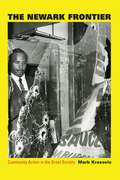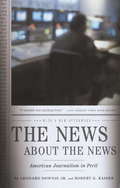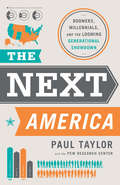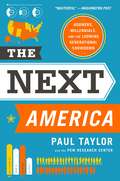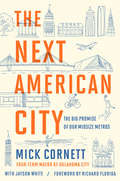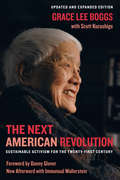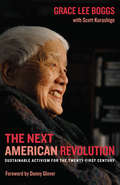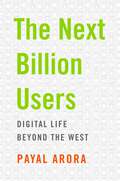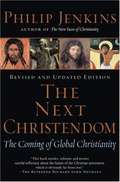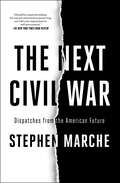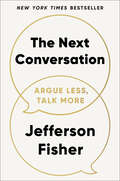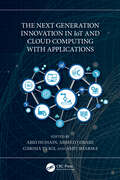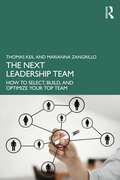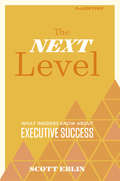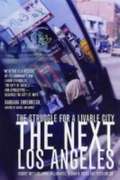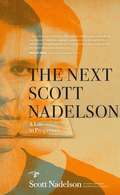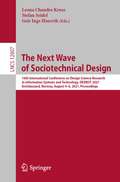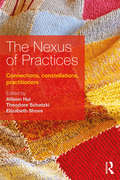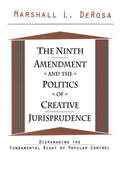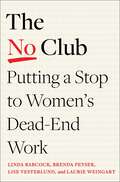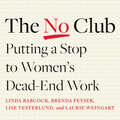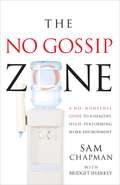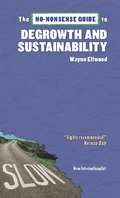- Table View
- List View
The Newark Frontier: Community Action in the Great Society
by Mark KrasovicTo many, Newark seems a profound symbol of postwar liberalism's failings: an impoverished, deeply divided city where commitments to integration and widespread economic security went up in flames during the 1967 riots. While it's true that these failings shaped Newark's postwar landscape and economy, as Mark Krasovic shows, that is far from the whole story. The Newark Frontier shows how, during the Great Society, urban liberalism adapted and grew, defining itself less by centralized programs and ideals than by administrative innovation and the small-scale, personal interactions generated by community action programs, investigative commissions, and police-community relations projects. Paying particular attention to the fine-grained experiences of Newark residents, Krasovic reveals that this liberalism was rooted in an ethic of experimentation and local knowledge. He illustrates this with stories of innovation within government offices, the dynamic encounters between local activists and state agencies, and the unlikely alliances among nominal enemies. Krasovic makes clear that postwar liberalism's eventual fate had as much to do with the experiments waged in Newark as it did with the violence that rocked the city in the summer of 1967.
The News About the News
by Leonard Downie Jr. Robert G. KaiserTwo editors from the argue that, while there is some excellent journalism in the United States, much of it is puerile and uninformative. The nature of good journalism is discussed, with the and other papers held up as examples and local television news being singled out for strong opprobrium. <P><P>Separate chapters examine news production at newpapers, network television stations, local stations, and on the Internet.
The Next America
by Pew Research Center Paul TaylorThe America of the near future will look nothing like the America of the recent past.America is in the throes of a demographic overhaul. Huge generation gaps have opened up in our political and social values, our economic well-being, our family structure, our racial and ethnic identity, our gender norms, our religious affiliation, and our technology use.Today's Millennials-well-educated, tech savvy, underemployed twenty-somethings-are at risk of becoming the first generation in American history to have a lower standard of living than their parents. Meantime, more than 10,000 Baby Boomers are retiring every single day, most of them not as well prepared financially as they'd hoped. This graying of our population has helped polarize our politics, put stresses on our social safety net, and presented our elected leaders with a daunting challenge: How to keep faith with the old without bankrupting the young and starving the future.Every aspect of our demography is being fundamentally transformed. By mid-century, the population of the United States will be majority non-white and our median age will edge above 40-both unprecedented milestones. But other rapidly-aging economic powers like China, Germany, and Japan will have populations that are much older. With our heavy immigration flows, the US is poised to remain relatively young. If we can get our spending priorities and generational equities in order, we can keep our economy second to none. But doing so means we have to rebalance the social compact that binds young and old. In tomorrow's world, yesterday's math will not add up.Drawing on Pew Research Center's extensive archive of public opinion surveys and demographic data, The Next America is a rich portrait of where we are as a nation and where we're headed-toward a future marked by the most striking social, racial, and economic shifts the country has seen in a century.
The Next America
by Paul TaylorThe America of the near future will look nothing like the America of the recent past. America is in the throes of a demographic overhaul. Huge generation gaps have opened up in our political and social values, our economic well-being, our family structure, our racial and ethnic identity, our gender norms, our religious affiliation, and our technology use. Today’s Millennials-well-educated, tech savvy, underemployed twenty-somethings-are at risk of becoming the first generation in American history to have a lower standard of living than their parents. Meantime, more than 10,000 Baby Boomers are retiring every single day, most of them not as well prepared financially as they’d hoped. This graying of our population has helped polarize our politics, put stresses on our social safety net, and presented our elected leaders with a daunting challenge: How to keep faith with the old without bankrupting the young and starving the future. Every aspect of our demography is being fundamentally transformed. By mid-century, the population of the United States will be majority non-white and our median age will edge above 40-both unprecedented milestones. But other rapidly-aging economic powers like China, Germany, and Japan will have populations that are much older. With our heavy immigration flows, the US is poised to remain relatively young. If we can get our spending priorities and generational equities in order, we can keep our economy second to none. But doing so means we have to rebalance the social compact that binds young and old. In tomorrow’s world, yesterday’s math will not add up. Drawing on Pew Research Center’s extensive archive of public opinion surveys and demographic data, The Next America is a rich portrait of where we are as a nation and where we’re headed-toward a future marked by the most striking social, racial, and economic shifts the country has seen in a century.
The Next America: Boomers, Millennials, And The Looming Generational Showdown
by Paul Taylor Pew Research Pew Research CenterThe America of the near future will look nothing like the America of the recent past. America is in the throes of a demographic overhaul. Huge generation gaps have opened up in our political and social values, our economic well-being, our family structure, our racial and ethnic identity, our gender norms, our religious affiliation, and our technology use. Today's Millennials--well-educated, tech savvy, underemployed twenty-somethings--are at risk of becoming the first generation in American history to have a lower standard of living than their parents. Meantime, more than 10,000 Baby Boomers are retiring every single day, most of them not as well prepared financially as they'd hoped. This graying of our population has helped polarize our politics, put stresses on our social safety net, and presented our elected leaders with a daunting challenge: How to keep faith with the old without bankrupting the young and starving the future. Every aspect of our demography is being fundamentally transformed. By mid-century, the population of the United States will be majority non-white and our median age will edge above 40--both unprecedented milestones. But other rapidly-aging economic powers like China, Germany, and Japan will have populations that are much older. With our heavy immigration flows, the US is poised to remain relatively young. If we can get our spending priorities and generational equities in order, we can keep our economy second to none. But doing so means we have to rebalance the social compact that binds young and old. In tomorrow's world, yesterday's math will not add up. Drawing on Pew Research Center's extensive archive of public opinion surveys and demographic data, The Next America is a rich portrait of where we are as a nation and where we're headed--toward a future marked by the most striking social, racial, and economic shifts the country has seen in a century.
The Next American City: The Big Promise of Our Midsize Metros
by Mick Cornett Jayson WhiteFrom four-term Oklahoma City Mayor Mick Cornett, a hopeful and illuminating look at the dynamic and inventive urban centers that will lead the United States in coming years.Oklahoma City. Indianapolis. Charleston. Des Moines. What do these cities have in common? They are cities of modest size but outsized accomplishment, powered by a can-do spirit, valuing compromise over confrontation and progress over political victory. These are the cities leading America . . . and they're not waiting for Washington's help. As mayor of one of America's most improved cities, Cornett used a bold, creative, and personal approach to orchestrate his city's renaissance. Once regarded as a forgettable city in "flyover country," Oklahoma City has become one of our nation's most dynamic places-and it is not alone. In this book, Cornett translates his city's success-and the success of cities like his-into a vision for the future of our country. The Next American City is a story of civic engagement, inventive public policy, and smart urban design. It is a study of the changes re-shaping American urban life-and a blueprint for those to come.
The Next American Revolution
by Scott Kurashige Grace Lee Boggs Danny GloverA world dominated by America and driven by cheap oil, easy credit, and conspicuous consumption is unraveling before our eyes. In this powerful, deeply humanistic book, Grace Lee Boggs, a legendary figure in the struggle for justice in America, shrewdly assesses the current crisis--political, economical, and environmental--and shows how to create the radical social change we need to confront new realities. A vibrant, inspirational force, Boggs has participated in all of the twentieth century's major social movements--for civil rights, women's rights, workers' rights, and more. She draws from seven decades of activist experience, and a rigorous commitment to critical thinking, to redefine "revolution" for our times. From her home in Detroit, she reveals how hope and creativity are overcoming despair and decay within the most devastated urban communities. Her book is a manifesto for creating alternative modes of work, politics, and human interaction that will collectively constitute the next American Revolution.
The Next American Revolution: Sustainable Activism for the Twenty-first Century
by Scott Kurashige Dann Glover Grace Lee BoggsA world dominated by America and driven by cheap oil, easy credit, and conspicuous consumption is unraveling before our eyes. In this powerful, deeply humanistic book, Grace Lee Boggs, a legendary figure in the struggle for justice in America, shrewdly assesses the current crisis--political, economical, and environmental--and shows how to create the radical social change we need to confront new realities. A vibrant, inspirational force, Boggs has participated in all of the twentieth century's major social movements--for civil rights, women's rights, workers' rights, and more. She draws from seven decades of activist experience, and a rigorous commitment to critical thinking, to redefine "revolution" for our times. From her home in Detroit, she reveals how hope and creativity are overcoming despair and decay within the most devastated urban communities. Her book is a manifesto for creating alternative modes of work, politics, and human interaction that will collectively constitute the next American Revolution.
The Next Billion Users: Digital Life Beyond the West
by Payal AroraWhy do citizens of states with strict surveillance care so little about their digital privacy? Why do Brazilians eschew geo-tagging on social media? What drives young Indians to friend “foreign” strangers on Facebook and give “missed calls” to people? Payal Arora answers these questions and many more about the internet’s next billion users.
The Next Christendom: The Coming of Global Christianity (2nd edition)
by Philip JenkinsThe first edition of The Next Christendom has been hailed as a landmark in our understanding of modern Christianity. In this new and substantially expanded second edition, Jenkins continues to illuminate the remarkable expansion of Christianity in the global South--in Africa, Asia, and Latin America--as well as the clash between Islam and Christianity since September 11. Among the major topics covered are the growing schism between Northern and Southern churches over issues of gender and sexuality, immigrant and ethnic churches in North America, and a special section on the split within the Anglican Communion. The first in a three-book trilogy on the changes besetting modern Christianity, this award-winning book will be welcomed by all of those who have come to recognize Philip Jenkins as one of our leading commentators on religion and world affairs.
The Next Civil War: Dispatches from the American Future
by Stephen MarcheThe United States is coming to an end. The only question is how. &“Well researched and eloquently presented.&” —The Atlantic * &“It&’s not a matter of if but when: A civil war is on the way...In a time of torment, this is a book well worth reading.&” —Kirkus Reviews In this deeply researched work of speculative nonfiction that reads like Ezra Klein&’s Why We&’re Polarized crossed with David Wallace-Wells&’ The Uninhabitable Earth, a celebrated journalist takes a fiercely divided America and imagines five chilling scenarios that lead to its collapse, based on in-depth interviews with experts of all kinds. On a small two-lane bridge in a rural county that loathes the federal government, the US Army uses lethal force to end a standoff with hard-right anti-government patriots. Inside an ordinary diner, a disaffected young man with a handgun takes aim at the American president stepping in for an impromptu photo-op, and a bullet splits the hyper-partisan country into violently opposed mourners and revelers. In New York City, a Category 2 hurricane plunges entire neighborhoods underwater and creates millions of refugees overnight—a blow that comes on the heels of a financial crash and years of catastrophic droughts— and tips America over the edge into ruin. These nightmarish scenarios are just three of the five possibilities most likely to spark devastating chaos in the United States that are brought to life in The Next Civil War, a chilling and deeply researched work of speculative nonfiction. Drawing upon sophisticated predictive models and nearly two hundred interviews with experts—civil war scholars, military leaders, law enforcement officials, secret service agents, agricultural specialists, environmentalists, war historians, and political scientists—journalist Stephen Marche predicts the terrifying future collapse that so many of us do not want to see unfolding in front of our eyes. Marche has spoken with soldiers and counterinsurgency experts about what it would take to control the population of the United States, and the battle plans for the next civil war have already been drawn up. Not by novelists, but by colonels. No matter your political leaning, most of us can sense that America is barreling toward catastrophe—of one kind or another. Relevant and revelatory, The Next Civil War plainly breaks down the looming threats to America and is a must-read for anyone concerned about the future of its people, its land, and its government.
The Next Conversation: Argue Less, Talk More
by Jefferson FisherTHE INSTANT NEW YORK TIMES BESTSELLERFrom communication expert Jefferson Fisher, the definitive book on making your next conversation the one that changes everythingNo matter who you&’re talking to, The Next Conversation gives you immediately actionable strategies and phrases that will forever change how you communicate. Jefferson Fisher, trial lawyer and one of the leading voices on real-world communication, offers a tried-and-true framework that will show you how to transform your life and your relationships by improving your next conversation.Fisher has gained millions of followers through short, simple, practical videos teaching people how to argue less and talk more. Whether it&’s handling a heated conversation, dealing with a difficult personality, or standing your ground with confidence, his down-to-earth teachings have helped countless people navigate life&’s toughest situations. Now for the first time, Fisher has distilled his three-part communication system (Say it with control, Say it with confidence, Say it to connect) that can easily be applied to any situation.You will learn:Why you should never &“win&” an argumentHow to assert yourself and communicate with intentionHow to set boundaries and frame conversationsWhy saying less is often moreHow to overcome conflict with connectionThe Next Conversation will give you practical phrases that will lead to powerful results, from breaking down defensiveness in a hard talk with a family member to finding your own assertive voice at the boardroom conference table. Your every word matters, and by controlling how you communicate every day, you will create waves of positive impact that will resonate throughout your relationships to last a lifetime.Everything you want to say, and how you want to say it, can be found in The Next Conversation.
The Next Generation Innovation in IoT and Cloud Computing with Applications
by Amit Sharma Ahmed J. Obaid Abid Hussain Garima TyagiThe Next Generation Innovation in IoT and Cloud Computing with Applications is a thought-provoking edited book that explores the cutting-edge advancements and transformative potential of the Internet of Things (IoT) and cloud computing. This comprehensive volume brings together leading experts and researchers to delve into the latest developments, emerging trends, and practical applications that define the next era of technological innovation.Readers will gain valuable insights into how IoT and cloud computing synergize to create a dynamic ecosystem, fostering unprecedented connectivity and efficiency across various industries. The book covers a wide spectrum of topics, including state-of-the-art technologies, security and privacy considerations, and real-world applications in fields such as healthcare, smart cities, agriculture, and more.With a focus on the future landscape of technology, this edited collection serves as a pivotal resource for academics, professionals, and enthusiasts eager to stay at the forefront of the rapidly evolving IoT and cloud computing domains. By offering a blend of theoretical perspectives and hands-on experiences, The Next Generation Innovation in IoT and Cloud Computing with Applications serves as a guide to the forefront of technological progress, providing a roadmap for the exciting possibilities that lie ahead in this era of connectivity and digital transformation.
The Next Leadership Team: How to Select, Build, and Optimize Your Top Team
by Thomas Keil Marianna ZangrilloCEOs and organizational leaders are only as strong as the teams they build. And yet it is surprising how little practical advice there is for senior leaders on how to create, build, and optimize their teams. Step up The Next Leadership Team. Illustrated with real-life examples from interviews with CEOs, C-Suite members, and headhunters throughout, The Next Leadership Team explains how senior leaders can improve the performance of their leadership teams by identifying clear team approaches, associated team member profiles, and by leading that team. These ideas are brought to life with case studies and interviews with well-known corporations such as ABB, Allianz, Amazon, AXA, Best Buy, Capita, Danone, Deutsche Telekom, Ferrari, Freudenberg, Haier, Hilti, HSBC, Holcim, Huawei, Logitech, Microsoft, Nestlé, Netflix, Nokia, Nordea, Schneider Electric, Tata, Wipro, and Zurich Insurance. This book is an invaluable resource for CEOs and senior executives who need to build and develop leadership teams to drive success in the organizations they lead. It is also relevant to headhunters who are involved in the appointments of members of senior leadership teams.
The Next Level: What Insiders Know About Executive Success, 3rd Edition
by Scott EblinMuch as Good to Great described what seperates top companies from the rest, The Next Level: What Insiders Know about Executive Success shows executives what seperates leadership success from failure at the next level. Every day, high performers are tapped to be executives and then left alone to figure out how to succeed in their new role. When this happens, most executives rely on strengths that served them well earlier in their careers. As executive coach Scott Eblin explains, this is why 40 percent of them fail. Moving successfully to the executive level requires knowing which behaviors and beliefs to let go, as well as which new onces to pick up. This confidence-building book outlines a program for success based on frank advice from accomplished senior executives around the world on what to do and, just as important, what to avoid. Like having a personal executive coach at your side, this valuable book shows you what to pick up and let go of to be successful at the next level. This fully revised edition of The Net Level is an essential addition to any leadership development or executive education toolkit.
The Next Los Angeles: The Struggle for a Livable City
by Robert Gottlieb Mark Vallianatos Regina Freer Peter DreierThis book shows how reformers have fought to transform a city characterized by huge economic disparities, concrete-encased rivers, and an endless landscape of subdivisions, freeways, and malls into a progressive model for regions around the country. The Next Los Angeles includes a decade-by-decade historical snapshot of the city's progressive social movements and an in-depth exploration of key trends that are remaking Los Angeles at the beginning of the twenty-first century.
The Next Scott Nadelson
by Scott NadelsonBeginning in the summer of 2004, Scott Nadelson's life fell apart. His fiancée left him a month before their planned wedding for another woman who made her living performing as a drag king. He moved into a drafty attic. His car's brakes went out. He learned that his cat was dying. Over the next two years, he'd struggle, with equivocal and sometimes humiliating results, to get back on his feet, in the process re-examining his past to understand his present circumstances.The Next Scott Nadelson: A Life in Progress is a literary self-portrait that revolves around the dissolution of a relationship but encompasses the long process of a young man's halting self-discovery. Exploring episodes from the life of its author/narrator marked by failure, suffering, and hope, as well as literary and cultural influence, the book weighs the things that make us want to give up against the things that keep us going. Though many of the pieces are comic and self-deprecating-some self-lacerating-they are above all meditations on the nature of the self and the way it can be constructed through memory, desire, and the imagination. Together they form a larger narrative, a search for fulfillment and identity in a life often governed by fear.With humor and unflinching honesty, Scott Nadelson scrutinizes his life to discover who he is and finds just how elusive such a discovery can be. To read the resulting book is to join him on a personal journey that is thoughtful, surprising, occasionally hilarious, and unapologetically human.
The Next Wave of Sociotechnical Design: 16th International Conference on Design Science Research in Information Systems and Technology, DESRIST 2021, Kristiansand, Norway, August 4–6, 2021, Proceedings (Lecture Notes in Computer Science #12807)
by Stefan Seidel Leona Chandra Kruse Geir Inge HausvikThis book constitutes the thoroughly refereed proceedings of the 16th International Conference on Design Science Research in Information Systems and Technology, DESRIST 2021, held in Kristiansand, Norway, in August 2021.*The 24 revised full research papers, included in the volume together with 6 short contributions and 7 prototype papers, were carefully reviewed and selected from 78 submissions. They are organized in the following topical sections: impactful sociotechnical design; problem and contribution articulation; design knowledge for reuse; emerging methods and frameworks for DSR; DSR and governance; the new boundaries of DSR.*Apart from the planned on-site event, the hybrid conference model was explored due to the Covid-19 pandemic.
The Nexus of Practices: Connections, constellations, practitioners
by Elizabeth Shove Allison Hui Theodore SchatzkiThe Nexus of Practices: connections, constellations, practitioners brings leading theorists of practice together to provide a fresh set of theoretical impulses for the surge of practice-focused studies currently sweeping across the social disciplines. The book addresses key issues facing practice theory, expands practice theory’s conceptual repertoire, and explores new empirical terrain. With each intellectual move, it generates further opportunities for social research. More specifically, the book’s chapters offer new approaches to analysing connections within the nexus of practices, to exploring the dynamics and implications of the constellations that practices form, and to understanding people as practitioners that carry on practices. Topics examined include social change, language, power, affect, reflection, large social phenomena, and connectivity over time and space. Contributors thereby counter claims that practice theory cannot handle large phenomena and that it ignores people. The contributions also develop practice theoretical ideas in dialogue with other forms of social theory and in ways illustrated and informed by empirical cases and examples. The Nexus of Practices will quickly become an important point of reference for future practice-focused research in the social sciences.
The Night the Angels Came
by Cathy GlassEight year old Michael is part of a family of two, but with his beloved father given only months to live and his mother having died when he was a toddler, he could soon become an orphan. Will Cathy's own young family be able to handle a child in mourning? To Cathy's surprise, her children insist that this boy deserves to be as happy as they are, prompting Cathy to welcome Michael into her home. A cheerful and carefree new member of the family, Michael devotedly prays every night, believing that when the time is right, angels will come and take his Daddy to be with his Mummy in heaven. However, incredibly, in the weeks that pass, the bond between Cathy's family, Michael and his kind and loving father Patrick grows. Even more promising, Patrick is looking healthier than he's done in weeks. But just as they are settling into a routine of blissful normality, an unexpected and disastrous event shatters the happy group, shaking Cathy to the core. Cathy can only hope that her family and Michael's admirable faith will keep him strong enough to rebuild his life.
The Ninth Amendment and the Politics of Creative Jurisprudence: Disparaging the Fundamental Right of Popular Control
by Marshall DeRosaThe Ninth Amendment holds that every right not explicitly granted to the federal government by the Constitution belongs to the states or to the individual. Further, those rights held by the government should not be construed to deny or disparage other rights held by the people. As in other areas of contention between federal power and states' rights, the Ninth Amendment has become subject to activist Supreme Court interpretation whereby the traditional model of federalism, in which states had meaningful public policy prerogatives, has given way to a model in which states become mere extensions of the U. S. government.In this volume, Marshall DeRosa provides a thorough analysis of Supreme Court unenumerated rights policy and offers suggestions toward reestablishing American federalism as envisioned by the framers of the Constitution. The book opens with a review and analysis of current debates over Ninth Amendment rights and then utilizes the privileges and immunities clauses as demonstrative of the traditional relationship between the states' police powers and unenumerated fundamental rights. DeRosa then considers the critical role of academia in shifting public policy away from popular control and toward the judiciary. Later chapters include national and state case studies as instances of judicial creativity, an examination of the effects of Ninth Amendment jurisprudence on the Second Amendment as it bears on the gun control debate, and a comparative analysis of contrasting theories on the status of unenumerated rights. In his conclusion DeRosa offers some prescriptive thoughts on how to restore the original constitutional concept of popular consent as a remedy to an increasingly unaccountable federal judiciary.By restoring the Ninth Amendment to the context of American federalism, this volume constitutes a major contribution to contemporary scholarship, challenging a corpus of commentary that either ignores, misunderstands, or misrepresents the relevance of popular control in the articulation of unenumerated rights. The Ninth Amendment and the Politics of Creative Jurisprudence will be of interest to political scientists, historians, legal theorists, and political practitioners.
The No Club: Putting a Stop to Women’s Dead-End Work
by Linda Babcock Brenda Peyser Lise Vesterlund Laurie R. WeingartA practical guide for bringing gender equality to the workplace with a new imperative: unburden women's careers from work that goes unrewarded.THE NO CLUB started when four women who were crushed by endless to-do lists banded together over $10 bottles of wine and vowed to get their work lives under control. Running faster than ever, they nevertheless trailed behind their male colleagues. And so, they vowed to say no to requests that pulled them away from the work that mattered most to their careers. This book reveals how their over-a-decade-long journey and groundbreaking research uncovered that women everywhere are unfairly burdened with "non-promotable work", a tremendous problem we can - and must - solve.All organizations have work that no one wants to do: planning the office party, screening interns, attending to that time-consuming client, or simply helping others with their work. From office housework to important assignments that inevitably go unrewarded, a woman, most often, takes on these tasks. In study upon study, professors Linda Babcock (bestselling author of WHY WOMEN DON'T ASK), Brenda Peyser, Lise Vesterlund, and Laurie Weingart - the original "No Club" - document that women are disproportionately asked and expected to do this kind of work. This imbalance leaves women overcommitted and underutilized as companies forfeit revenue, productivity, and top talent.But it doesn't have to be this way. THE NO CLUB walks you through how to make small, yet important, changes to your own workload and empowers women to make savvy decisions about what they take on. At the same time, the authors illuminate how lasting change calls for organizations to reassess how they assign and reward work to level the playing field. With hard data, personal anecdotes from women of all stripes, practical self- and workplace-assessments, and innovative advice from consulting in Fortune 500 companies, this book will forever change the conversation about how we advance women's careers and achieve equality in the twenty-first century.
The No Club: Putting a Stop to Women’s Dead-End Work
by Linda Babcock Brenda Peyser Lise Vesterlund Laurie R. WeingartA practical guide for bringing gender equality to the workplace with a new imperative: unburden women's careers from work that goes unrewarded.THE NO CLUB started when four women who were crushed by endless to-do lists banded together over $10 bottles of wine and vowed to get their work lives under control. Running faster than ever, they nevertheless trailed behind their male colleagues. And so, they vowed to say no to requests that pulled them away from the work that mattered most to their careers. This book reveals how their over-a-decade-long journey and groundbreaking research uncovered that women everywhere are unfairly burdened with "non-promotable work", a tremendous problem we can - and must - solve.All organizations have work that no one wants to do: planning the office party, screening interns, attending to that time-consuming client, or simply helping others with their work. From office housework to important assignments that inevitably go unrewarded, a woman, most often, takes on these tasks. In study upon study, professors Linda Babcock (bestselling author of WHY WOMEN DON'T ASK), Brenda Peyser, Lise Vesterlund, and Laurie Weingart - the original "No Club" - document that women are disproportionately asked and expected to do this kind of work. This imbalance leaves women overcommitted and underutilized as companies forfeit revenue, productivity, and top talent.But it doesn't have to be this way. THE NO CLUB walks you through how to make small, yet important, changes to your own workload and empowers women to make savvy decisions about what they take on. At the same time, the authors illuminate how lasting change calls for organizations to reassess how they assign and reward work to level the playing field. With hard data, personal anecdotes from women of all stripes, practical self- and workplace-assessments, and innovative advice from consulting in Fortune 500 companies, this book will forever change the conversation about how we advance women's careers and achieve equality in the twenty-first century.
The No-Gossip Zone
by Sam ChapmanThe first business guide to address the leading challenge to workplace productivity and employee retention: gossip. Business leaders routinely cite gossip as one of the top problems their companies face in terms of productivity and employee retention. According to a recent study performed by Equisys, the average employee spends 65 hours a year gossiping at the office. Luckily, there is a way to turn the tide and create a positive, productive work place and it all begins with The No Gossip Zone. Sam Chapman, the owner of one of Chicago's top public relations firms, has found a way to curb the corrosive chatter and create an environment of fun, acceptance, and empowerment at work. The No Gossip program was created and honed in Chapman's firm, where employees rave about the results. From clients to coworkers, gossip is outlawed and authentic communication is encouraged and it feels great!
The No-Nonsense Guide to Degrowth and Sustainability
by Wayne EllwoodThis guide explores the idea of economic growth, tracing its history and questioning why it has become so unchallengeable and powerful when unlimited growth in a finite world is ultimately impossible. It illustrates how economics based on degrowth can be turned into a positive and how we can arrive at new levels of environmental sustainability without having turning the clock back to the Dark Ages. A title for anyone interested in economics, the psychology of consumerism and progressive change.Wayne Ellwood is former co-editor of New Internationalist magazine. He is author of the No-Nonsense Guide to Globalization (over fifty thousand sold).
